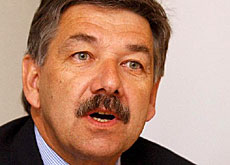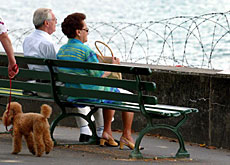G-8 brings kudos and headaches for Swiss

The Swiss authorities are gearing up for potentially violent protests later this week, when world leaders gather in neighbouring France for the annual G-8 summit.
Some say the French will get all the glory, while the Swiss will wind up with all the headaches.
Others argue that the meeting will offer Switzerland the opportunity to put the Lake Geneva region “back on the map” as a centre for international exchange.
“There’s no denying that a huge burden has been placed on Switzerland to organise the security for this meeting,” the deputy director of Geneva’s Graduate Institute for International Studies, Daniel Warner, told swissinfo.
“But it does have a certain advantage for Switzerland in that it gives it a certain profile and visibility,” he added.
Indeed, this year’s Swiss president, Pascal Couchepin, along with the leaders of 12 other nations, have been invited to take part in “extended” G-8 talks during the first day of the summit.
The meeting between the world’s seven most-industrialised nations and Russia kicks off in the French alpine resort of Evian on Sunday.
Anti-globalisation protests
In choosing Evian for the three-day gathering, the chair of the summit and French president, Jacques Chirac, picked a relatively remote and secure location – one side of the town is flanked by some of the highest mountains in the Alps, while the other faces Lake Geneva.
But just across the water lie the Swiss cities of Lausanne and Geneva, where tens of thousands of anti-globalisation demonstrators are expected to take to the streets over the coming days.
France will deploy around 18,000 police officers and soldiers during the event, while Switzerland plans to mobilise around 10,000.
Both sides have also put anti-terrorism measures in-place, including standby fighter planes to intercept any unauthorised aircraft.
German assistance
In addition, some 750 German police reinforcements have been drafted in to ensure security at Geneva’s international airport, where most of the G-8 leaders and their delegations are expected to arrive.
The decision to seek German assistance – under an agreement signed between Bern ands Berlin last year – came earlier this month, when it became clear that a shortage of Swiss officers was hampering preparations for the summit.
The chief spokesman for G-8 security in Switzerland, Jean-Christophe Sauterel, says the Swiss are now fully prepared to deal with any potential violence.
“We’ve put very comprehensive measures in place, which include German specialists and highly-trained Swiss officers, who are used to dealing with difficult situations in public places,” Sauterel told swissinfo.
“It’s very important for Switzerland’s image that this event goes well, which is why we’re doing everything in our power to make sure it does,” he added.
Shutdown
Despite such assurances, the summit has provoked a general sense of anxiety and unease among the local population.
Many Genevans fear that scenes similar to those during the 2001 G-8 meeting in Genoa, Italy – which was rocked by violence and riots – will be repeated in their city.
As a result, a large number of lake-area businesses, offices and schools have decided to close during the summit.
Luxury watch and jewellery shops have been encouraged to lock away or remove any valuables and to barricade their storefronts, while most major department stores have laid on extra security.
In addition, all automatic teller machines in so-called “high risk zones” have been emptied of cash.
The Geneva authorities have also decided to cordon-off the city’s international sector, including the area around the United Nations and the World Trade Organisation.
Meanwhile, smaller border-crossings between the two countries have already been closed and only authorised people will be allowed to go back and forth during the summit.
But despite all the security hassles and concerns, the federal authorities are optimistic that the benefits of the meeting will outweigh the burdens.
Swiss diplomacy
In fact, Livio Zanolari, of the Swiss foreign ministry, says Franco-Swiss relations have strengthened in recent months, as the result of intense cross-border collaboration.
“For us, France is an extremely important partner because it’s our neighbour and because France has a very important role on the international stage,” Zanolari told swissinfo. “So this contact with France is extremely precious and it’s a special opportunity.”
He also believes the event will offer Switzerland a unique opportunity for diplomatic exchange with both G-8 leaders and heads of state from other nations.
During the summit, Switzerland will play host to leaders from several emerging countries, as well as member states of the New Partnership for Africa’s Development (Nepad), who have been invited to take part in the “extended” G-8 talks on Sunday.
The officials from Algeria, Brazil, China, Egypt, India, Malaysia, Mexico, Morocco, Nigeria, Saudi Arabia, Senegal and South Africa have also been invited to attend an official state dinner in Lausanne, during which bilateral talks are scheduled to take place.
“We will have heads of state on Swiss soil and President Couchepin will meet with these leaders,” said Zanolari. “Members of the Swiss cabinet will also hold meetings with ministers from these countries… So it’s a huge opportunity that comes along rarely in Switzerland.”
swissinfo, Anna Nelson in Geneva
The upcoming G-8 summit is taking place in the French alpine resort of Evian, on the shores of Lake Geneva.
The annual gathering brings together the leaders of the world’s seven most-industrialised nations (Britain, Canada, France, Germany, Italy, Japan, and the United States) and Russia.
The Swiss city of Lausanne will play host to leaders of several African nations, as well as other emerging countries, who have been invited, along with Switzerland, to take part in “extended” G-8 talks.
Between 30,000 and 100,000 anti-globalisation demonstrators are expected to take to the streets in Geneva and Lausanne in protest against the summit.

In compliance with the JTI standards
More: SWI swissinfo.ch certified by the Journalism Trust Initiative


You can find an overview of ongoing debates with our journalists here . Please join us!
If you want to start a conversation about a topic raised in this article or want to report factual errors, email us at english@swissinfo.ch.